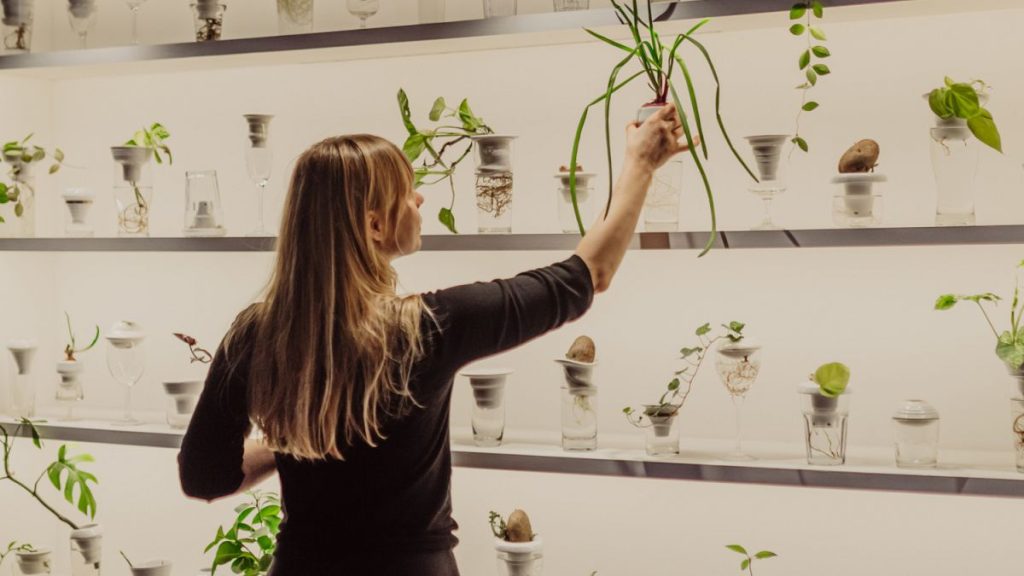Alicja Patanowska’s art installation titled PLANTATION has recently been inaugurated at the Urban Farmer Project, an innovative sustainable urban farm located in the bustling City of London. This initiative is particularly timely as it seeks to address issues of food waste and promote sustainable food production amidst the commercial hustle of the Fleet Street Quarter. Patanowska, a Polish artist known for her engagement with themes of waste and luxury, utilized this installation to elevate awareness of environmental sustainability and plant care. The artwork comprises a variety of handmade porcelain components designed to facilitate the growth of plants, herbs, and vegetables through hydroponic methods, paired with an assortment of repurposed drinking glasses ranging from pint containers to champagne flutes, collected from both London streets and Patanowska’s hometown in Poland.
Patanowska’s inspiration for PLANTATION can be traced back to her experiences as a student at the Royal College of Art, where she was struck by the considerable number of disposed drinking glasses found outside pubs and bars in London. Over the past decade, she has channeled this initial moment of realization into a creative endeavor focused on upcycling these discarded materials into art. The installation features 200 vessels that collectively contribute to a dynamic ecosystem, allowing audiences to witness the growth and transformation of the plants throughout the duration of the installation at the Urban Farmer Project. With the exhibit slated to continue until December 12, 2024, it serves not only as an artistic endeavor but as an interactive experience for visitors who can observe how the installation evolves over time.
Patanowska expressed enthusiasm for her work being part of the Urban Farmer Project, highlighting the importance of creating a more eco-conscious community and enhancing green spaces in urban environments. She emphasized the critical role of nurturing nature and fostering a balanced life, especially in light of the ongoing climate crisis. The installation aligns well with the Urban Farmer Project’s broader mission to intertwine sustainability, education, and creative expression within the cityscape, aiming to create a climate-resilient district accessible to all. Lucy French, the CEO of Fleet Street Quarter Business Improvement District, echoed this sentiment, underscoring the cultural significance and the potential of such art installations to deepen connections between communities.
PLANTATION is not just a singular endeavor but part of a wider narrative. Co-produced with various organizations including the Ministry of Foreign Affairs of the Republic of Poland, the Polish Cultural Institute in London, and the British Council, this site-specific installation exemplifies the collaborative spirit that underpins much of contemporary art today. It is set in the former bar of Landsec’s Hill House development, strategically positioned to connect with the public while also fostering educational and cultural exchange. As the Urban Farmer Project evolves as an educational hub and market aimed at combating food poverty, Patanowska’s installation is integral to this transformative vision.
The project as a whole manages to cultivate relationships between art, agriculture, and community engagement. It serves as a reminder of the vital need for sustainable practices in urban settings where natural spaces often face neglect. The Urban Farmer Project promotes not only access to locally sourced sustainable produce but also supports British agriculture, ensuring that the ecological and community resilience is prioritized. Through installations like PLANTATION, the project fosters a greater understanding of the relationship between art and environmental awareness, encouraging individuals to rethink their consumption habits and relationship with nature.
In conclusion, Alicja Patanowska’s PLANTATION stands as a vital piece within the larger tapestry of urban sustainability efforts in London. It reflects both the artist’s personal journey and the collective aspiration of the Urban Farmer Project to create a resilient and sustainable urban environment. By inviting the public to engage with living art, the installation promotes an awareness of ecological responsibility and cultivates a community dialogue about the significance of caring for our natural surroundings. And as the exhibition continues until December 2024, it remains an evolving testament to the intersection of creativity, sustainability, and community engagement, showcasing how art can play a pivotal role in addressing contemporary challenges.














